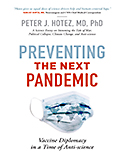Preventing the Next Pandemic Vaccine Diplomacy in a Time of Anti-science

Author: Peter Hotez, MD, PHD
Affiliation:
Publisher: Johns Hopkins University Press
Publication Date: 2021
ISBN 10: 1421440385
ISBN 13: 9781421440385
eISBN: 9781421440392
Edition: 1st
Affiliation:
Publisher: Johns Hopkins University Press
Publication Date: 2021
ISBN 10: 1421440385
ISBN 13: 9781421440385
eISBN: 9781421440392
Edition: 1st
Description:
The last five years saw a significant return of epidemic infectious disease, culminating in COVID-19. In our new post-COVID-19 world, how do we prevent future illnesses by expanding scientific and vaccine diplomacy and cooperation, especially to combat the problems that humans have brought on ourselves? Modern diseases and viruses have been spurred anew by war and conflict as well as shifting poverty, urbanization, climate change, and a new troubling anti-science/anti-vaccination outlook. From such twenty-first-century forces, we have seen declines in previous global health gains, with sharp increases in vaccine-preventable and neglected diseases on the Arabian Peninsula, in Venezuela, in parts of Africa, and even on the Gulf Coast of the United States. In Preventing the Next Pandemic, international vaccine scientist and tropical disease and coronavirus expert Peter J. Hotez, MD, PhD, argues that we can-and must-rely on vaccine diplomacy to address this new world order in disease and global health. Detailing his years in the lab developing new vaccines, Hotez also recounts his travels around the world to shape vaccine partnerships with people in countries both rich and poor in an attempt to head off major health problems. Building on the legacy of Dr. Albert Sabin, who developed the oral polio vaccine with Soviet scientists at the height of the Cold War, he explains how he is still working to refresh and redirect vaccine diplomacy toward neglected and newly emerging diseases. Hotez reveals how-during his Obama-era tenure as the US Science Envoy for the Middle East and North Africa, which coincided with both the rise in these geopolitical forces and climate change-he witnessed tropical infectious diseases and established vaccine partnerships that may still combat them up close. He explores why, since 2015, we've seen the decline of global cooperation and cohesion, to the detriment of those programs that are meant to benefit the most ...
Related Titles
